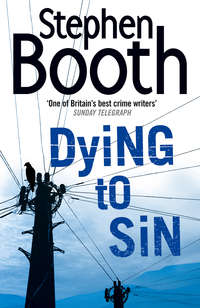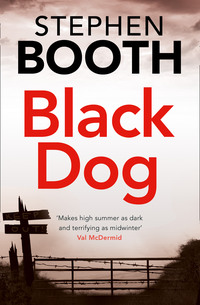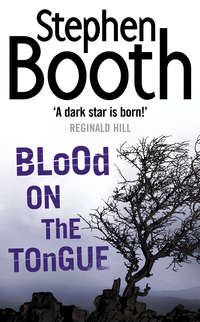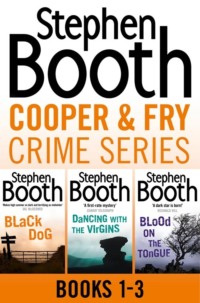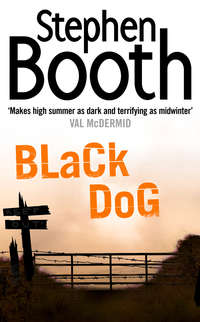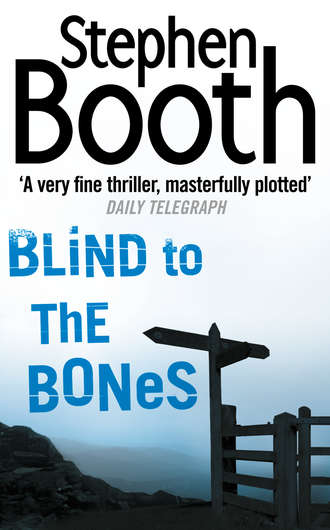
Полная версия
Blind to the Bones
‘Tomorrow? It’s Sunday tomorrow, Diane.’
‘A good day for a drive to Withens, then.’
Murfin sniffed. ‘There’s no good day for a drive to Withens.’
Ben Cooper had his hand on the gate, and had been about to lift the latch. But he stopped at the sound of the voice. A man stood near the end house of Waterloo Terrace, watching Cooper carefully. He had been standing quite still, so that Cooper, who had been more interested in the state of the gardens, hadn’t even noticed him. The man was wearing a dark suit and a white shirt, but no tie, and his suit trousers were tucked into black wellington boots. Cooper guessed him to be in his fifties. He had a balding head and some strands of sandy hair that stood up at his temples and moved in the breeze. But his hair was the only thing about him that moved. Even his eyes were quite still, fixed firmly on Cooper. His hands were hanging by his sides, and he carried no weapon of any kind, yet still managed to convey a clear threat.
Cooper felt slightly nervous as he reached for his warrant card, worried that the movement might be taken the wrong way. Maybe he was becoming paranoid, but he had begun to feel that there were other pairs of eyes watching him, too, from somewhere.
‘Detective Constable Cooper, Edendale Police,’ he said. ‘Who am I speaking to?’
The man didn’t reply. His expression shifted subtly from suspicion to contempt, as if a detective ought to know whose house he was visiting.
‘Are you Mr Oxley?’ said Cooper.
‘What do you want?’
Cooper realized that he would have to read the answers in the man’s eyes. This was almost certainly Mr Oxley. Lucas, presumably. The father of Scott, Ryan, Jake and maybe of Sean.
‘If you’re Mr Lucas Oxley, I’d like to talk to you.’
‘Don’t come any further, I said.’
Cooper had automatically begun to lift the latch of the gate again, assuming that once he had made verbal contact, he would be allowed to enter. But he was wrong.
‘What I have to ask you, sir, might not be something you want everyone to hear. Not something you’d want to shout out to your neighbours.’
‘That’s perfectly all right. I’ve no intention of shouting.’
‘I need to ask you –’
‘You don’t need anything. Not from me.’
Cooper was sure he could see movement through one of the downstairs windows of the second house, number two. The curtains were open, but the interior was too dark to be sure if there was anyone there, without staring too hard.
‘You are Mr Oxley, aren’t you?’ said Cooper.
‘Happen I am.’
‘I’ve just been to the church, where there’s been a break-in.’
To Cooper’s surprise, Oxley simply turned on his heel and walked away down the passage between the two end houses. The strands of hair bounced around his ears for a moment until he had disappeared into the shadows.
Cooper opened the gate and took a few steps after him.
‘Mr Oxley!’ he called.
Then he stopped. Something had made the back of his neck prickle uneasily. He stood where he was, a couple of yards along the path from the gate, and he looked at the house. There were certainly faces peering through the windows. Two, three or four of them. He could see their eyes watching his movements. They were like a family glued to a television screen, waiting for the next exciting moment, another car chase or a fight scene. They didn’t look worried, or frightened. They looked expectant.
Yet now that Lucas Oxley had disappeared, there was almost complete silence in the front gardens of Waterloo Terrace. Almost, but not quite. Cooper’s ears caught a faint click, then a strange skittering noise approaching from the far end of the ginnel.
At the last moment, Cooper turned and ran for the gate. He knew he didn’t have time to open it, so he dived at the wall and vaulted it just as a huge, shaggy-haired Alsatian burst from the arched entrance of the ginnel and hurtled down the path towards him.
Cooper stood gasping in the roadway on the other side of the wall, ready to run for his car. But nothing happened. The dog was utterly silent. It hadn’t barked once, or even let out a snarl. It had made no sound as it went for him, except for the skittering of its claws on the concrete of the ginnel. But it seemed to have halted the moment Cooper was on the other side of the gate, and therefore out of its territory.
Cooper looked up at the house, expecting to see satisfied expressions on the faces behind the window. But they weren’t satisfied yet. They were still expectant.
Then a dark shape flashed across Cooper’s field of vision, and a set of sharp white teeth clashed together a few inches from his face. He caught a brief glimpse of a wildly rolling eye as the Alsatian threw itself into the air and lunged its head above the gate in its desperation to sink its fangs into him. He stepped back, sweating. If he had leaned over the gate to see where the dog was, several inches of skin would have been missing from his face by now.
But it was the silence of the dog that was the most terrifying. It was the silence of an animal trained to attack and injure, rather than simply to frighten.
‘Mr Oxley!’ he called. ‘I’m a police officer. This isn’t an acceptable way to behave, you know.’
Silence. And now even the faces had disappeared, satisfied at last. Perhaps this was the favourite form of entertainment in Waterloo Terrace.
Cooper took a few deep breaths and moved several paces back from the gate. He wondered what his next move should be. He had a strong feeling that he’d made a stupid tactical mistake. He hadn’t been thinking about what he was doing, or why. As a result, he’d put his own safety at risk.
It wasn’t something he should admit to, if he could avoid it. He was aware that there had been incidents in the recent past that had already put that question mark over his actions, in some people’s minds. DS Diane Fry would take pleasure in marking it down in his personnel record, he was sure.
Follow procedure, he had been told. But sometimes it was hard. One day, he was going to fail to follow procedure, and that would be the end.
‘Are you OK, Ben?’ PC Udall was looking at him from the road, a slightly puzzled expression on her face. Cooper became aware that he probably didn’t look too good. He had been up since well before dawn, and had dressed in his most casual clothes for the raid, which was already a couple of hours ago. He probably hadn’t looked too good to Lucas Oxley, either. It was his own fault that he had nearly lost some skin to Mr Oxley’s dog.
‘Yes, I’m fine.’
‘I thought we’d lost you.’
‘You nearly did just then. Are we ready to go?’
‘Ready when you are.’
As he waved Tracy Udall off from the car park, Ben Cooper poked around for a CD to play on the way back to Edendale in his Toyota. He found a recent Levellers album and was pleased by the title, Green Blade Rising.
On the way out of the village, he noticed two men with a tractor and a length of rope near the pool in the river. Another man was standing in the water in PVC waders. He was already pretty well covered in duckweed as he struggled to attach the rope to one of the boards that floated on the surface of the pool.
‘Strange,’ said Cooper to himself. And he tapped his fingers to the Levellers as he drove out of Withens.
8
Instead of going back into the wrecked vestry before he left the church that night, Derek Alton turned across the front of the altar and stood for a moment on the patch of stone flags that was always cold. The sunlight from the windows never reached this spot during the day. This was where Alton believed he could feel the presence of the Spirit in the cool air that surrounded him. It was a real, tangible presence. It touched his face with a kind of intimacy and cooled his skin like fresh spring water. It gave him a shiver of pleasure at the awareness of something clean and wonderful beyond the reality of Withens. A few moments of silent contemplation normally helped to calm his anxieties. But tonight it didn’t seem to be working.
Derek Alton had his car parked by the churchyard gate. It was a creaking old Escort – all that he could afford, since Anglican clergymen were employed by God, and God didn’t pay wages. The old rectory was right behind the church, but the incumbent at St Asaph’s no longer had use of it, because it was too big and too expensive for the diocese to maintain. Instead, he and Caroline had been given a bungalow on the new street above the village. And the bungalow was small – too small for the large family that Caroline wanted.
As he passed through the churchyard towards the gate, Alton automatically checked for new litter or damage. Recently, Foster’s lager seemed to have been a favourite among the youths who came here in the evening. He could spot the blue cans easily in the brambles and bracken. They had invariably been emptied, then crushed in the middle. Alton pictured one of the Oxley boys casually showing off his adolescent strength to his friends as he smoked another cigarette, rolled another joint, or sniffed another Evo-Stik from a crisp packet. Well, he really had no idea what the youngsters did in the churchyard at night, and he didn’t care to speculate too much.
The lager cans always joined the dead flowers and plastic plant pots in a black bin by the side of the church porch. But the bin hadn’t been emptied for weeks, and now its lid lay uselessly on the ground, unable to contain the overflowing debris. Alton wondered what the bottom of the bin was like. What was hatching and pupating down there in the foetid darkness? What white, squirming things would be munching their way through the rotting detritus? Now that the weather was warming up, he would soon find out, if the bin weren’t emptied. One morning, he would be battling his way through clouds of mosquitoes and swarms of bluebottles to reach the church door.
He caught a flash of incongruous colour in the darkness near the church wall. But it wasn’t a Foster’s lager can. At some time, a small cloth gnome with a red cap, blue jacket and white beard had been left on the memorial stone for a former churchwarden. Another Oxley, of course.
As he unlocked his car, Alton looked up towards the village. There were streetlamps in Withens – ten of them. He knew the exact number because he’d counted them during the first week after his arrival. They had seemed then to be a symbol that civilization had actually reached the village, and he had clutched at their presence for comfort against the impression communicated by the dark stone houses and gloomy hillsides. But now, as he looked towards the village from the church door, he was struck again by a simple fact about the streetlamps. They lit the road, but not the houses. Their cold, orange glare cast the homes beyond them into even darker shadows.
Even if there had been lighting on their street, he wouldn’t have been able to see the new bungalows from here. In fact, all he could see of Withens were the ten streetlamps on the road, the windows of the Quiet Shepherd, and the outline of the pub’s roof.
But Alton also saw a group of dark figures moving up the road towards the lights of the village. They were passing from one streetlamp to another, and they looked a little unsteady – whether from tiredness or alcohol, or both, he couldn’t tell. He presumed they were the Oxleys – Lucas, Scott, Ryan and a couple of their cousins. Not to mention old Eric Oxley himself. The Border Rats were out tonight.
Diane Fry stared straight ahead through her windscreen at the Sheffield streets, not wanting even to look at the man beside her in the car. She had let him stand by her passenger window for a few moments before she pressed the button to release the central locking. It wasn’t that she had any doubts who he was – his brown overcoat and sparse ginger hair were recognizable even through the rain streaking her car windows. It was just that there was always a little voice at the back of her brain that kept nagging at her when she was doing something stupid. There had been a short, internal battle before she had subdued the voice sufficiently to let him in.
Now that he was inside the car, all her senses were prickling at his presence, and her muscles were tensed for danger. Yet he had shown no sign of being a threat to her. Fry knew she had to take control of the situation to keep it that way.
‘What name is she going under?’ she said.
She could hear the man breathing. He wasn’t someone who answered questions too quickly – a habit he had probably learned the hard way.
‘Not the one you know,’ he said.
Fry was unduly conscious of his masculine bulk as he slumped in the seat next to her, with his right elbow and leg positioned too close, intruding a little too far into her personal space. The interior of a car was too confined for her ever to feel differently. And it didn’t matter who it was in the passenger seat – one of her DCs, Gavin Murfin or Ben Cooper – it was always the same. She had thought for a while of telling Murfin he’d have to ride in the back seat. But she knew he would have liked it, because he could pretend he was a passenger in a taxi, and she was his chauffeur. And God knew what damage it would do to her back seat. During the winter, there had been fungi growing from the carpet in the front, where Murfin had scattered his constant supply of junk food.
‘No, I didn’t think it would be the name I know,’ she said. ‘That’s why I’m asking you.’
He didn’t reply, and Fry knew that he was smirking, even without turning her head to look at him. She tried to remember whether she had any air freshener in her glove compartment. She would need to use it once he had left, to take away the memory of him.
‘I need a name,’ she said. ‘And I need an address.’
She could hear him fumbling around in his pockets, then realized that he had taken out a packet of cigarettes. She heard a click and saw the tiny flame reflected in the glass of the windscreen.
‘If you light that up in my car, I’ll shove it down your throat,’ she said.
The man laughed, but let the flame die.
‘What are you doing here on your own?’ he said. ‘Where’s your partner? Aren’t you supposed to work in pairs? I mean, it can be a bit dangerous, can’t it? Especially for a female.’
‘Not for me.’
‘No?’
‘No.’
‘Well, I believe you, love. Thousands wouldn’t.’
‘I couldn’t give a damn what you believe. I’m not here to discuss your powers of perception, or even whether you’re able to see what’s in front of your face. But if you push me, you’ll find out.’
‘All right, all right. Keep your hair on.’
Fry turned away to stare out of the driver’s side window, as if she might be able to forget that he was there if she couldn’t see him out of the corner of her eye. But she was still aware of him through the small noises of his movements, the sound of his breathing, his male smell, and the sulphurous whiff of the match he had struck. She knew there were drops of rain glistening on his scalp among the freckles and the tufts of ginger hair, and she was aware of the dark, wet patches on the shoulders of his coat. And with two of them sitting in a stationary car, the interior was getting too warm from their body heat and the glass was starting to steam up. She wound down the window a couple of inches.
They were parked in a street between the dark, blank walls of crumbling factories. But straight ahead, she could see traffic lights and a busier road that was well lit, with cars passing constantly, and a row of terraced houses with flickering TV screens visible through their curtains and shadows passing in front of lamps in upstairs windows. One of the factories must have a night shift. She could hear the rumble of machinery from somewhere nearby.
‘A name?’ she said impatiently.
‘She’s living with a bloke called Akerman. Johnny Akerman. Not many folks will mess with him. He’s well known around those parts.’
‘Which parts?’
‘Eh?’
‘I need an address.’
‘I can’t tell you that, love.’
‘Look, don’t waste my time.’
‘I can’t do it.’
‘Can’t, or won’t?’
She felt him turning towards her in his seat. His knee touched the gear stick. A fold of his coat fell over the handbrake towards her, and she instinctively flicked it away. He was holding out his hands in a gesture of appeal, and his face was a pale smear that she was much too aware of. He was willing her to meet his eyes, but she couldn’t.
‘It’s not worth it,’ he said. ‘It could get me a hell of a lot of bother. I mean, it’s not as if there’s anything in it for me, is there?’
‘Oh yes,’ said Fry. ‘You’re going to feel a whole lot better, after you tell me.’
‘I don’t think so, darling.’
Fry pressed the button to close the central locking and reached out to start the ignition.
‘Hey, what are you doing?’ he said.
‘I think we should go for a little ride.’
‘No way. I’m getting out.’
‘I suggest you put your seat belt on,’ said Fry. ‘It’s not safe without, you know.’
‘For God’s sake –’
She pulled out from the kerb and drove towards the lights at the end of the road.
‘This is the compromise,’ she said. ‘And it’s entirely for your benefit. You say you can’t give me the address for this Akerman. OK. I accept that. So what we do instead is, we go for a little drive.’
‘Where to?’
‘You decide,’ she said. ‘You give me directions.’
She could practically hear him working it out. He was wondering what the best way was to get out of this madwoman’s car.
‘Right, left or straight on at the lights?’ she said.
He was silent so long that she had almost reached the lights, and she was beginning to think that he wouldn’t go along with it. But he was, after all, a man who didn’t answer questions too quickly.
‘If I were you, I’d go left,’ he said. ‘It’s the scenic route.’
They drove for a few minutes. Fry’s passenger hardly spoke, but gave her directions by holding up a hand at junctions to indicate left or right. She guessed he was thinking that he would honestly be able to say that he had never told her anything.
‘Stop here,’ he said.
‘Is this it?’
‘I get out here.’
They were in a street of Victorian terraces, with little flights of steps to their front doors and drawn curtains. Fry pulled up in front of a row of shops, mostly boarded up, but for an Asian greengrocer’s where the lights were still on.
‘Is this it?’ she said again.
‘Yes,’ he snapped. ‘The red door. But if you’re going to try to get in there, you’re crazier than I thought.’
‘Thanks for the concern. It’s touching.’
He got out, slammed the door and in a moment had vanished into the darkness, walking quickly in the shadow of the deserted shop fronts.
Fry had no intention of going into the house. She was prepared to wait for as long as necessary.
In the end, it took two hours. When the woman finally appeared, Fry got out of the car and walked towards her along the pavement, pulling up the collar of her black coat and tucking her chin into her red scarf. She stared at the woman openly, trying to see the girl she was looking for in the way that the woman walked, the angle she held her head, or the look in her eyes.
Fry didn’t stop or speak to the woman. She walked on past her, and continued to the end of the block, where she came to a halt on the kerb and stared blankly at the corner of an empty florist’s shop. For a few seconds, she had been walking along an entirely different street in another city, in a different time. She had been a younger Diane Fry, the one who had looked into every face she passed, expecting to see someone else. But trying to see ghosts never worked. It hadn’t then, and it didn’t work now.
As Fry listened to the woman’s footsteps fade away behind her, a door opened and closed, a car sounded its horn on the corner and drove away with a screech of tyres, and she realized that she had forgotten where she was.
But, worst of all, she had forgotten why she had been trying to see someone who wasn’t there.
Somehow, Ben Cooper had found himself in a room whose walls were covered in white tiles, many of them crazed into patterns of tiny cracks that had absorbed dirt over the years. The only light came from two tiny windows over the doors on to the street, and even the windows were covered in steel mesh and spiders’ webs. In front of the doors stood a white Land Rover with its bonnet propped open. There was an overwhelming smell of old sump oil inside the stuffy space.
Cooper took a step down into the garage, then stopped. He knew he was in the wrong place. The day had been going badly already, and this was getting worse. He must have been too tired or distracted to be concentrating properly, otherwise he would never have ended up here.
And what a place to be. The tiles made the garage look the way public toilets had done once, before vandalism had made local councils adopt a more cost-effective approach. Bare breeze-block and polished aluminium were the style these days.
But it was the smell that made Cooper’s hands begin to itch. They immediately felt as though they were covered in grease, and his fingernails were scraped and ragged, and full of black dirt. The pathways in his brain had been stimulated by the oily smell, prompted into recalling the many times he had peered and poked inside the engine compartment of a similar Land Rover, or sometimes a David Brown tractor. He could feel the cold metal under his fingers, which were always numb, because it always seemed to be winter. And he could feel the old blue overalls that he had worn, with the sleeves rolled up over his wrists because they were a couple of sizes too big for him.
Most often, the young Ben had been completely ignorant of what he was supposed to be doing inside the engine. But he had been enjoying the feeling of a shared moment, whether it had been with his older brother Matt, or his uncle John. Or even, rarely, his father. Joe Cooper had not been quite so tolerant of inexperienced help, and would snatch a spanner from his son’s hand the second he looked likely to turn it the wrong way. There was a curious kind of bonding that took place over a set of dirty spark plugs or a blocked fuel jet. The words alone, as they came into his mind, made Cooper smile with something like nostalgia.
Following a trace of light, he walked to the back of the garage and found himself in a workshop behind it. Two men were in there, drinking tea from mugs. One of them wore overalls, and the other was in uniform, with a yellow jacket and the peaked cap of a traffic officer on a bench next to him. They both looked up at Cooper in amazement. The traffic officer twitched, and spilled some of his tea on his uniform trousers.
‘Can we help?’ said the one in overalls.
‘I’ve just come from a meeting upstairs and I think I must have taken a wrong turn,’ said Cooper. ‘Can you show me the way out?’
‘CID, are you?’
‘Yes.’
‘Thought so.’
‘I’m DC Cooper, from Edendale.’
The expression on the traffic officer’s face changed, and Cooper knew what he was going to say.
‘I’m Dave Ludlam,’ he said. ‘I knew your dad.’
‘A lot of people did.’
‘I served with him for a while, when I was a young bobby. He was a good sergeant, Joe Cooper. Tough, but fair.’
Ludlam put his mug down as if preparing for a long conversation. ‘I bet you’re really proud of him,’ he said.
‘Yes, of course. Look –’
‘It was a tragedy, what happened. A tragedy.’
Cooper bit his lip. He wanted always to look as though he was proud of his father. But it made it hard to let people know that he really, really didn’t want to talk about what happened. Not any more. There had to be a time when he could get on with his life without someone thrusting the fact of his father’s death in his face all the time and waiting for him to react.


